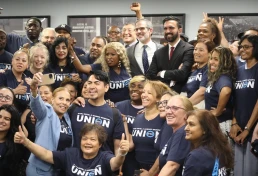A detailed account of the Democrats’ alienation from working America and how candidates like Dan Osborn and Zohran Mamdani point the way forward.
By Jackson Rubin, The Working Model
Introduction
As a Research Assistant at the Center for Work and Democracy at Arizona State University throughout my time in college, I spent two years immersed in a project that tracked the full spectrum of American political ambition. We compiled every congressional candidate from 2010 to 2024—Democrat, Republican, and Independent alike. Winning incumbents with 80 percent of the vote, write-ins who earned two votes. My job was to code their biographical information, occupations, and messaging to answer a simple question: what kind of candidates actually convey a credible commitment to working people?

That research supported a broader collaboration with the Center for Working-Class Politics and later informed their report, “Trump’s Kryptonite: How Progressives Can Win Back the Working Class.” Our shared goal was to map the gap between the Democratic Party’s self-image and its actual electoral base to identify why the party that still calls itself the “party of the working class” keeps losing working-class voters. The data made one thing clear: when politicians talk about jobs, when they name corporate power as the enemy, and when they elevate candidates who come from non-elite backgrounds, they win more working-class votes across race and region. Yet, even as this evidence has piled up, the Democratic Party’s leadership seems unwilling (or unable) to internalize it.
Today the consequences of that failure are visible in the numbers. According to Gallup, the Democratic Party is polling at just 34 percent—lower than Donald Trump, lower than the Republican Party, and the lowest level in the decades Gallup has been asking the question. Fundraising has cratered, enthusiasm has evaporated, and the base itself is losing faith. In June, the Democratic National Committee reported only $15 million on hand, compared to the Republican National Committee’s $80 million, a shortfall driven by disillusionment and internal infighting. That matters. Enthusiasm matters. Trust in your own side matters. Democrats don’t just need people who want them to win; they need people willing to make them win.
The story this tells is one of alienation. Working-class voters have defected. They are waiting for a politics that speaks to their lives. The Democratic Party’s survival depends on rediscovering that voice and reviving an authentic economic populism rooted in working-class representation, not elite self-image.
Recent Posts
Congress, Do Your Job and End This Illegal War of Aggression By The U.S. and Israel
March 2, 2026
Take Action Now Congress must assert its Constitutional authority over matters of war and peace against an out-of-control, rogue president and…
Daniel Ellsberg Speaks to Us as the War on Iran Continues
March 2, 2026
Take Action Now Ellsberg’s voice is back via a compelling new book. “Truth and Consequence,” being published this week, provides readers with his…
The Supreme Court Hears a Line 5 Oil Pipeline Case With High Stakes for Treaty Rights
March 2, 2026
Take Action Now The Straits of Mackinac aren’t just ecologically critical — they’re the center of the Anishinaabe creation story.By…
As Trump Bombs Iran, We Need to Reckon With the American War Machine
March 1, 2026
Take Action Now We cannot afford to slip into despair. We must push back against militarism everywhere, at every turn.By Negin Owliaei ,…




